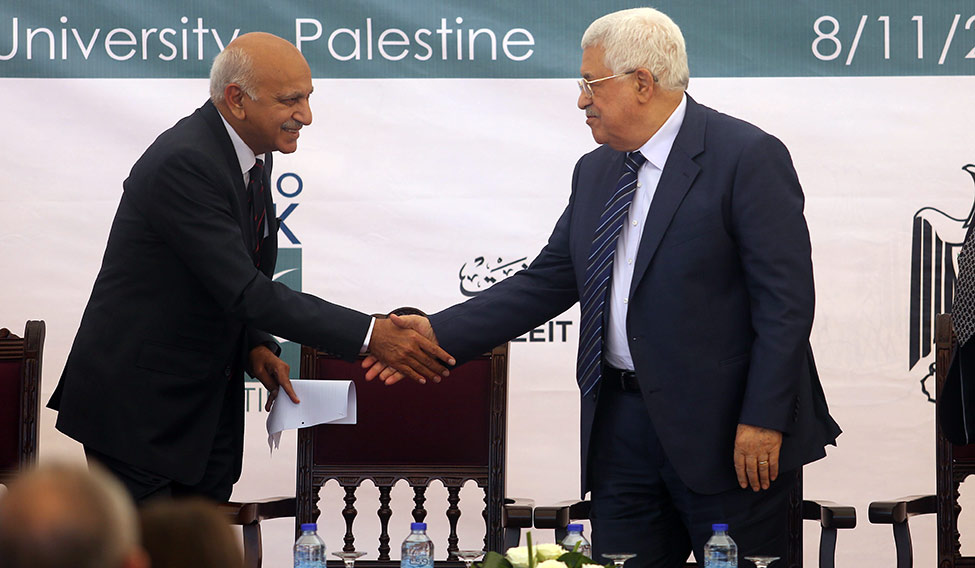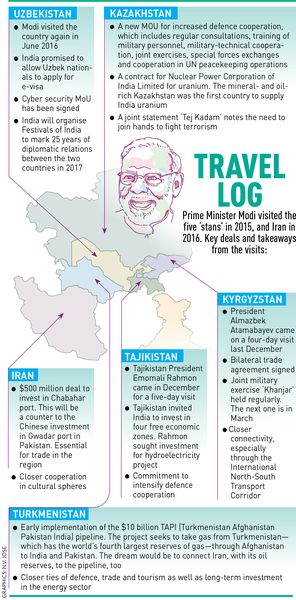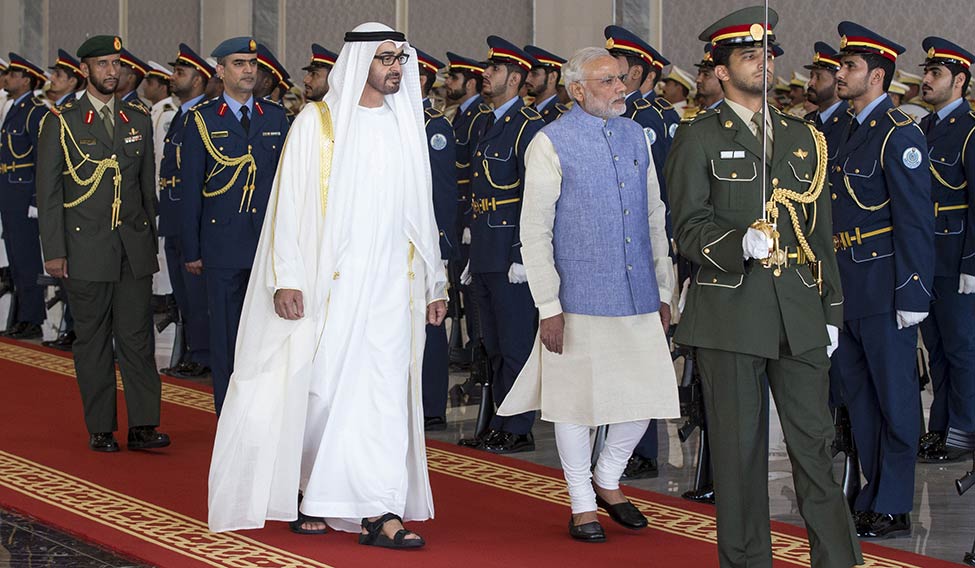India is pulling out all stops for welcoming Abu Dhabi crown prince Sheikh Mohammed bin Zayed al-Nahyan this Republic Day. There are date palms on a traffic island in the heart of New Delhi, and he will have his men marching down Rajpath, matching step for step with Indian faujis. This is his second visit to India; the first one was in February last year. His invitation to this Republic Day parade as chief guest is a departure from convention. Usually, the honour is reserved for heads of government.
There is “a lot” on the table, Navdeep Suri, India’s ambassador to the United Arab Emirates, has been quoted in an interview. India will inch closer to the UAE with the Comprehensive Strategic Partnership Agreement—the first ever such deal the UAE will sign with any country. For India, it spells out closer defence cooperation, especially in counter terrorism and maritime security. Also, India hopes the UAE will also target India’s number one terrorist—Dawood Ibrahim—who has assets there. Cooperation in counter terrorism is essential as Islamic State spreads its tentacles across the region.
Apart from closer ties of the military kind—important to India, especially as the UAE is an ally of Pakistan—there will be movement on enhanced economic cooperation. There is the coveted $75 billion infrastructure development fund that the UAE will hopefully spend in India over the next ten years. The two countries hope to hit the $100 billion figure in the next five years. For the UAE, that is hoping to get its economy more diversified from oil, and India, looking for more foreign investments, the economics of the relationship will be important.
 M.J. Akbar, seen here with Palestine President Mahmoud Abbas, visited the country last year, which resulted in the first-ever Joint Commission Meeting with Palestine to build capacity | AFP
M.J. Akbar, seen here with Palestine President Mahmoud Abbas, visited the country last year, which resulted in the first-ever Joint Commission Meeting with Palestine to build capacity | AFP
The wooing of the UAE is only a part of the larger vision that Modi has—winning friends in the Islamic world. “It is an out-of-the-box idea,” says Professor P.R. Kumaraswamy of School of International Studies at Jawaharlal Nehru University. It is particularly bold as Modi comes with baggage, owing to the strident hindutva image of the BJP. But, as Kumaraswamy says, “Modi is a different person when he is abroad. He is a secular, inclusive person outside India, as his constituency is different. The first place he visited in the UAE was a mosque. In India, he doesn’t even attend the iftar party of the president. It helps that his agenda is economics, and not politics.”
So far, he has been successful at increasing the level of engagement in the region. India and Saudi Arabia have become much closer. Modi was even awarded the highest civilian honour. His visit to the UAE in August 2015 was the first for an Indian prime minister in 34 years. Since then, every country in West Asia has had political visits by Indian leaders.

Foreign secretary S. Jaishankar had coined a term for it—‘Think West’. At the 2015 Raisina Dialogues, he said: “The point that I wish to emphasise is that we are no longer content to be passive recipients of outcomes.... Our growing capabilities and stronger national branding, in fact, make us a credible partner. We ourselves also have a more nuanced view of recent developments in the region.”
This, however, requires a fine balance. The MEA has been trying to balance binaries. It has come out of the closet with its relationship with Israel. Yet, it wants to focus on Palestine. There have been grand gestures to signal that the two countries are equally important. On a visit last year by minister of state for external affairs M.J. Akbar, officials ensured that the minister, who had just visited Israel, travelled to Palestine through Jordan rather than cross over from the Israeli border. It took hours longer, but a point was made. The visit resulted in the first-ever Joint Commission Meeting with Palestine to build capacity. The symbolism wasn’t lost on the Palestine leadership. Officials claim that the Palestine foreign minister requested India to be part of the Peace Conference held recently in Paris. Though nothing concrete was achieved at the conference, it did show, as an MEA official put it, the “depth” of the relationship.
Akbar’s visit to Syria—a gesture that “moved” President Bashar al-Assad as a “friend’’ had chosen to make the difficult journey—was similar. “I think the consequences of that will be visible soon enough,” said Akbar at the midterm review of the MEA. India has not yet taken a public position on Syria, but the visit made a statement.
The reaching out to the Arab world was part of the BJP’s 2009 election manifesto. And, Modi seems to be following that. His government has reached out much more to the Islamic world than the Manmohan Singh government. He has also chosen to expand the region by including Central Asia, which is strategically important, especially as China’s influence is growing in the area and Afghanistan is fighting for its survival. The region had dropped off the MEA priority list since P.V. Narasimha Rao. There was a series of visits to the five stans—Kazakhstan, Turkmenistan, Kyrgyzstan, Tajikistan and Uzbekistan—in the last few years (see box). The question is can he pull it off? “There was a lot of hope generated,” says Nandan Unnikrishnan, vice president and senior fellow, Observer Research Foundation. “We have recognised our extended neighbourhood and we have started building networks. But if you look from July 2015 to January 2017, not much has changed.”
The blitz of high-profile visits may have happened, but there has been no followup, in terms of smaller delegations involving culture or even academic ties—the stuff that binds countries together.
India’s NATO (No Action, Talk Only as one Burmese general famously said) status will be the biggest stumbling block for Modi’s ambitious vision of India and the Islamic world. There has been an attempt to speed up pending projects and hand them over, like the Afghan Parliament, but India needs to move fast—whether it is in West Asia or in Central Asia, where, former diplomat Ashok Sajjanhar, says “China is a newcomer and has made quick gains.”
Another reason for engaging this part of the world is Pakistan, and isolating it trumps anything. This has become even more urgent post the Uri attacks. For, the Gulf countries—desperately trying to keep away IS from coming closer—have been particularly supportive of India.
But, as Sajjanhar says, “We need to move closer to the region. There is renewed interest, especially with Afghanistan. We need to move to strengthen our position; we can’t make our foreign policy hostage to Pakistan.”







